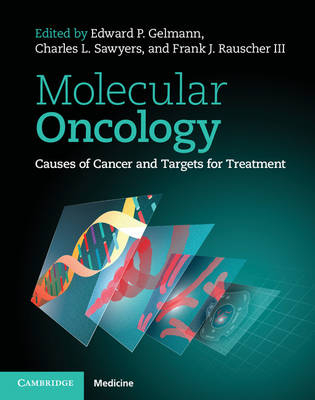
Molecular Oncology
Causes of Cancer and Targets for Treatment
Seiten
2013
Cambridge University Press (Verlag)
978-0-521-87662-9 (ISBN)
Cambridge University Press (Verlag)
978-0-521-87662-9 (ISBN)
The genomic era has greatly facilitated the understanding of the molecular changes that underlie malignant transformation. This timely foundation for understanding the origins of molecular oncology reviews available technologies for cancer analysis, summaries of key oncogenic pathways for a wide range of human malignancies, and pharmacologic therapies in development.
The genomic era has allowed enormous strides in our understanding of the molecular changes that underlie malignant transformation. Mutations have been discovered that are critical drivers of large cross-sections of human cancers. These discoveries have allowed us to find drugs that target these drivers and make important strides in treatment. Genomics and high-throughput technologies have illuminated the complexity of cancer and the facility with which cancers adapt during their natural history. The field is evolving rapidly with new discoveries and new drugs reported monthly. This book is a timely foundation for understanding in context the origins of molecular oncology and its future directions. The content reviews available technologies for the analysis of cancer tissues and genes; summaries of key oncogenic pathways from a molecular perspective; the technologies, pathways and targeted therapies of a wide range of human malignancies; and new pharmacologic therapies that have a common mechanistic target.
The genomic era has allowed enormous strides in our understanding of the molecular changes that underlie malignant transformation. Mutations have been discovered that are critical drivers of large cross-sections of human cancers. These discoveries have allowed us to find drugs that target these drivers and make important strides in treatment. Genomics and high-throughput technologies have illuminated the complexity of cancer and the facility with which cancers adapt during their natural history. The field is evolving rapidly with new discoveries and new drugs reported monthly. This book is a timely foundation for understanding in context the origins of molecular oncology and its future directions. The content reviews available technologies for the analysis of cancer tissues and genes; summaries of key oncogenic pathways from a molecular perspective; the technologies, pathways and targeted therapies of a wide range of human malignancies; and new pharmacologic therapies that have a common mechanistic target.
Edward P. Gelmann is Chief of the Division of Hematology/Oncology and Deputy Director for Clinical Research at the Herbert Irving Comprehensive Cancer Center and Columbia University Medical Center, New York, NY, USA. Charles L. Sawyers is Chair of the Human Oncology and Pathogenesis Program at Memorial Sloan-Kettering Cancer Center, New York, NY, USA. Frank J. Rauscher III is Professor of the Gene Expression and Regulation Program, Professor of the Tumor Microenvironment and Metastasis Program, and Deputy Director for Basic Research at the Wistar Institute Cancer Center, Philadelphia, PA, USA.
Part I; Part II; Part III; Part IV. Pharmacologic Targeting of Oncogenic Pathways.
| Erscheint lt. Verlag | 19.12.2013 |
|---|---|
| Zusatzinfo | 91 Tables, black and white; 6 Halftones, unspecified; 79 Halftones, color; 42 Line drawings, unspecified; 238 Line drawings, color |
| Verlagsort | Cambridge |
| Sprache | englisch |
| Maße | 225 x 282 mm |
| Gewicht | 2900 g |
| Themenwelt | Medizinische Fachgebiete ► Innere Medizin ► Hämatologie |
| Medizin / Pharmazie ► Medizinische Fachgebiete ► Onkologie | |
| ISBN-10 | 0-521-87662-1 / 0521876621 |
| ISBN-13 | 978-0-521-87662-9 / 9780521876629 |
| Zustand | Neuware |
| Haben Sie eine Frage zum Produkt? |
Mehr entdecken
aus dem Bereich
aus dem Bereich
Hämatologie und Internistische Onkologie
Buch | Softcover (2023)
ecomed-Storck GmbH (Verlag)
CHF 179,95
Buch | Softcover (2024)
Urban & Fischer in Elsevier (Verlag)
CHF 73,00


